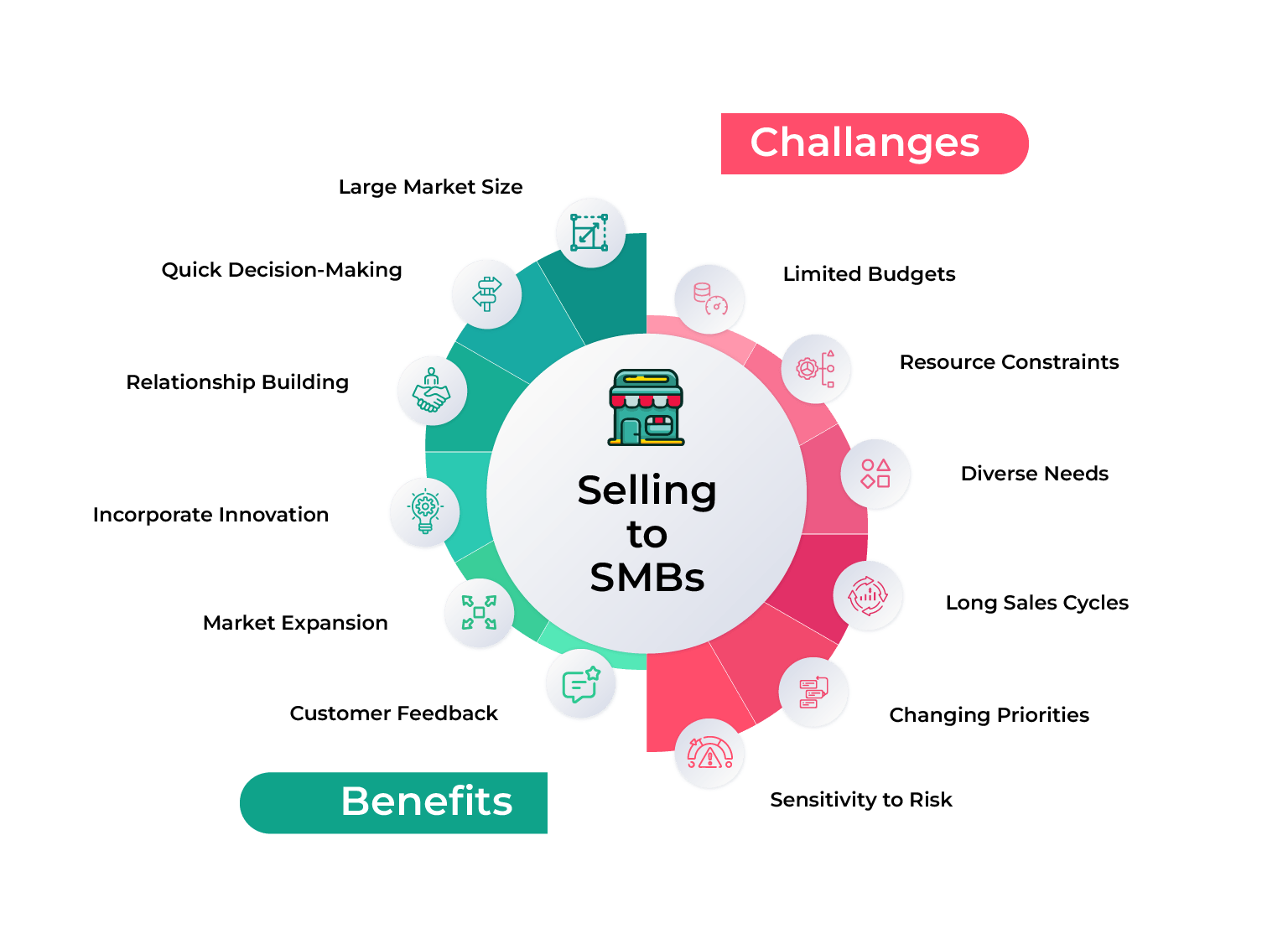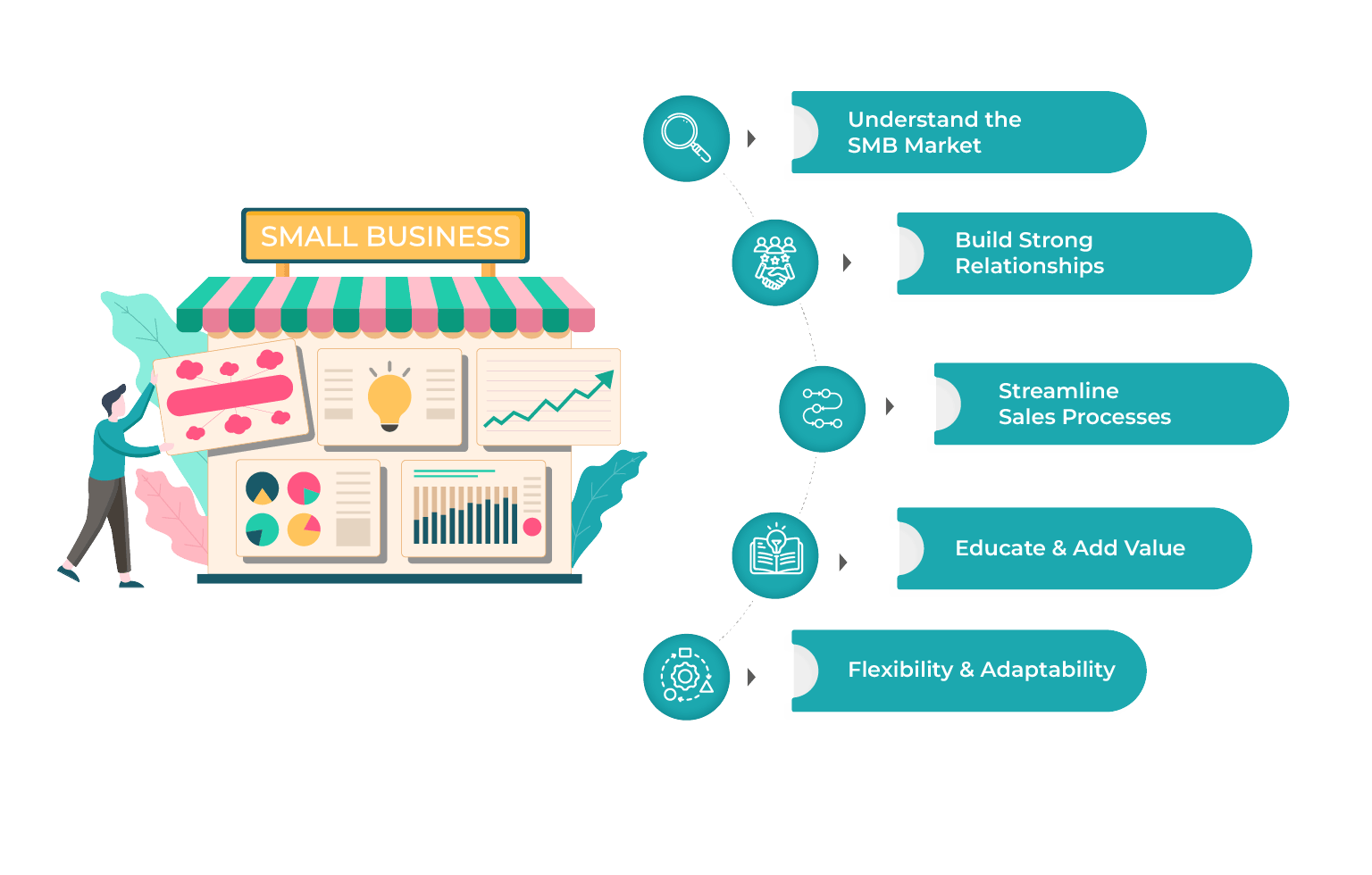
Blog
What Is SMB Sales and How Can It Transform Your Business?
December 23, 2023


Kennect Insider: Stay ahead of the curve!
Subscribe to our newsletter packed with latest trends and insights on incentives.
Thank you! Your submission has been received!
Oops! Something went wrong while submitting the form.
Your data is in safe hands. Check out our Privacy policy for more info
Small businesses take a major part of our business industry.
According to statistics there are 33.2 million small businesses in the US and constitute 99.9% of American businesses. This shows the impact of small and medium businesses in leading growth and success.
So how do sales tap the possibilities of the SMB market to their advantage?
In this article, we will explore SMB sales, its benefits and challenges, and how to implement SMB sales strategy.
What Is SMB Sales?
SMB stands for small and medium-sized businesses and is typically defined by their size in terms of revenue, number of employees, or other relevant metrics. Thus SMB sales definition refers to sales activities and processes that target this industry.
SMB sales teams focus on selling products or services to these smaller businesses. It focuses on specialized fields that require an understanding of the unique challenges and opportunities associated with smaller businesses.
The goal is to provide value to SMB customers while building lasting relationships that contribute to the growth and success of both the SMBs and the companies selling to them.
Benefits of Selling to SMBs?
Selling to SMBs can offer various benefits for companies. So let's look at a few of the benefits of targeting the SMB market:
Large Market Size
SMBs represent a significant portion of the business landscape. It is a large and diverse market with millions of small and medium-sized businesses globally. This diversity allows companies to find opportunities, and targets, and sell across various industries and sectors.
Quick Decision-Making
SMBs make decisions quickly compared to larger enterprises and thus can lead to faster sales cycles and a more responsive customer base. This allows SMB companies to adapt their products or services to meet evolving needs. Implementing strategic sales spiffs can further enhance their agility, incentivizing sales teams and driving accelerated growth through targeted promotions and rewards.
Relationship Building
Building strong relationships with SMBs can lead to long-term partnerships. In many cases, SMBs value personal connections and trust in their business relationships. Thus, establishing a solid rapport with SMB clients can result in loyalty and repeat business.
Incorporate Innovation
SMBs are more willing to adopt new technologies and innovative solutions. They have an easier decision-making process that makes it easier for them to implement changes in their operations. This opens opportunities for companies selling cutting-edge products or services.
Market Expansion
Selling to SMBs can be a strategic way to expand into new markets. For companies that have traditionally focused on larger enterprises, entering the SMB market allows for diversification that makes them immune during economic downturns in specific sectors.
Customer Feedback
SMBs are more open to providing feedback and collaborating closely with vendors. This collaboration can lead to the development of customized solutions, improved products, and better alignment with customer needs.
With a large number of benefits offered by SMBs companies can build their SMB sales strategy to explore these possibilities and widen their opportunities.
For further reading, check Unlocking Success: Crafting a Winning Sales Performance Improvement Plan.

Challenges of Selling to SMBs?
While SMB sales can offer various benefits, it also comes with its set of challenges. Some common hurdles include limited budgets, longer sales cycles, and the need for personalized approaches.
Additionally, navigating the diverse needs of small and medium-sized businesses can pose a significant challenge for sales teams. To address these obstacles effectively, businesses may consider utilizing tools such as a sales pipeline calculator to optimize their sales processes and forecast more accurately.
Limited Budgets
SMBs often operate with tighter budgets compared to larger enterprises. This can make it challenging to sell higher-priced products or services. Sales teams targeting SMBs must offer cost-effective solutions that provide value within budget constraints.
Resource Constraints
Many SMBs have limited resources and budgets to incorporate newer ones. This can impact their ability to adopt and implement new technologies or solutions. Sales teams may need to provide additional support and education to help SMBs overcome resource limitations.
Diverse Needs
SMBs are a diverse group with varying needs across different industries and sectors. Creating a one-size-fits-all solution may not be effective. Sales professionals must be adaptable and capable of customizing offerings to meet the specific requirements of individual SMB customers.
Long Sales Cycles
Though it's easier for SMBs to make faster decisions, they still can have longer sales cycles due to limited bandwidth and the need for thorough evaluation before committing to a purchase. Hence, for faster closing of deals, sales teams must leverage a sales accelerator providing the necessary information and support throughout the decision-making process.
Changing Priorities
SMBs may be more susceptible to changes in the business environment due to economic conditions or shifting priorities. This can result in alterations to budgets and decision-making processes. Sales teams must stay informed about their customers' businesses to anticipate and adapt to these changes.
Additionally, the distinction between a sales representative and a sales associate becomes crucial in tailoring communication strategies to better resonate with the diverse roles and expectations within SMBs.
Sensitivity to Risk
SMBs can be more risk-averse compared to larger companies. They might hesitate to adopt new technologies or solutions without clear evidence of benefits or without being assured of minimal disruption to their operations.
Successfully navigating these challenges requires a deep understanding of the SMB market, flexibility in sales approaches, and a commitment to building long-term relationships. Incorporating sales as a service models can further enhance adaptability, providing businesses with the agility to access specialized sales resources when needed, thereby contributing to the establishment of enduring client partnerships.
How to Implement an SMB Sales Strategy
Implementing a successful SMB sales strategy requires a targeted approach to address the unique needs of smaller enterprises. Let us look at a few steps to guide the implementation:

Understand the SMB Market
SMB sales and marketing strategy must conduct thorough research to understand the diverse landscape of SMBs by considering industry-specific challenges, budget constraints, and common pain points. This helps tailor your products or services to meet the specific needs of SMBs and be prepared to offer scalable solutions.
Build Strong Relationships
To build an effective SMB sales strategy focus on relationship-building as SMBs often value personal connections. Establish rapport through personalized communication, understanding the customer's business, and demonstrating a commitment to their success. Cultivate long-term partnerships by providing excellent customer service and support.
Streamline Sales Processes
SMB sales processes must be efficient and adaptable to the quick decision-making typical of SMBs. Simplifying the buying journey, providing clear information about your offerings, and making it easy for SMB customers to understand the value proposition will help in streamlining the sales process.
Educate and Add Value
SMBs may not have extensive expertise in every area of their operations. SMB sales reps must position themselves as a trusted advisor and offer educational resources, webinars, or consultations to help SMBs understand the benefits of your products or services.
Flexibility and Adaptability
Be flexible in adapting your offerings to the evolving needs of SMB customers. Demonstrate agility in responding to feedback and customizing solutions. Offer trial periods to allow SMBs to experience the value of your products or services with reduced risk.
Taking a systematic approach towards understanding small and medium-sized businesses and their industry and thereby building your sales strategy to cater to their needs and requirements helps in ensuring a higher conversion rate.
For further reading, check Unlock Your Business Potential with Effective B2B Sales Strategies.
Final Thought
Small and Medium Business is a market space that opens immense possibilities to the sales reps trying to crack a deal.
Understanding the SMB market, fostering strong relationships, streamlining sales processes, providing educational value, and being adaptable helps create an effective SMB sales strategy that aligns with the unique characteristics of smaller businesses.
Exploring the benefits it offers your business while being cautious of the hurdles and risks helps effectively strategize your sales process. In addition, regularly assessing and adjusting your strategy based on feedback and market dynamics ensures ongoing success.
To read more about sales-related topics connect with Kennect. For more information, Book A Demo NOW!
Kennect Insider: Stay ahead of the curve!
Subscribe to our newsletter packed with latest trends and insights on incentives.
Thank you! Your submission has been received!
Oops! Something went wrong while submitting the form.
Your data is in safe hands. Check out our Privacy policy for more info













